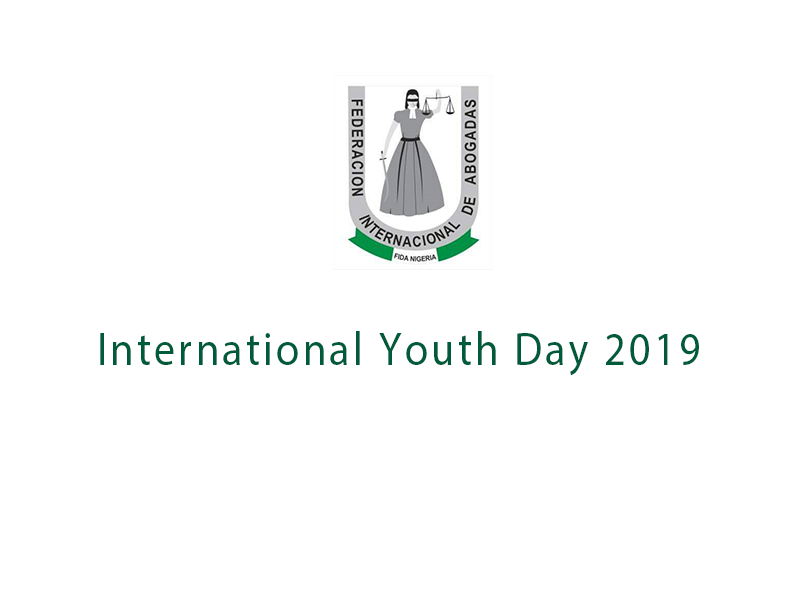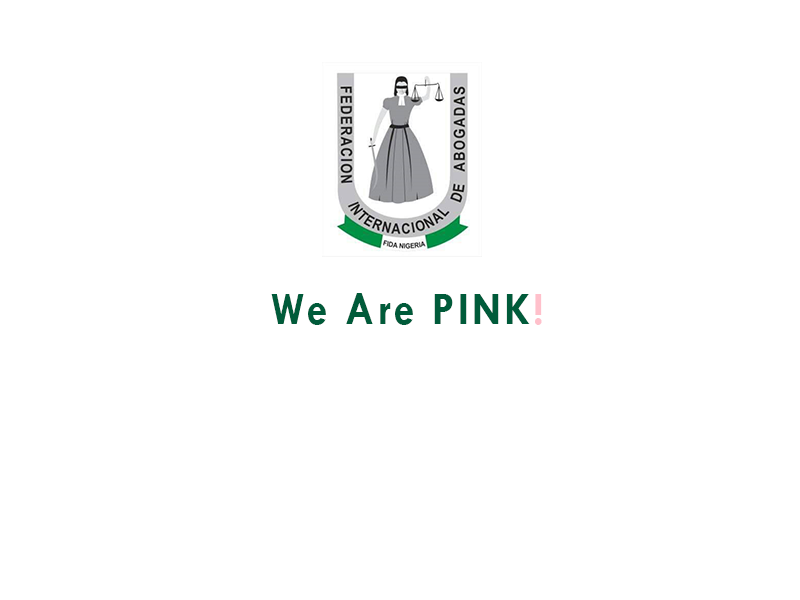
International Youth Day 2019
The International Federation of Women Lawyers (FIDA) Nigeria joins the rest of the world to mark 12 August as the International Youth Day. It is a day designated by the United Nations to celebrate youths all around the world and draw attention to a given set of cultural and legal issues surrounding the youths.
The theme of this year’s International Youth Day is “Transforming Education”. This year’s theme highlights efforts to make education more relevant, equitable and inclusive for all youths, including efforts by youths themselves. Education is indispensable in National development and that is why it is included as Goal 4 of the Sustainable Development Goals which states that nations should “ensure inclusive and equitable quality education and promote lifelong learning opportunities for all”.
According to the UN, even though primary education is officially free and compulsory, about 10.5 million of the country’s children aged 5-14 years are not in school. Only 61 percent of 6-11 year-olds regularly attend primary school and only 35.6 percent of children aged 36-59 months receive early childhood education. In the north of the country, the picture is even bleaker, with a net attendance rate of 53 percent. Getting out-of-school children back into education poses a massive challenge.
The youth of a Nation is the fulcrum of National Development and they need quality education to prepare for the future and their role in driving the development process. Education is a basic human right and has been recognized as such since the adoption of the Universal Declaration on Human Rights. Access to education is a right for all Nigerian Children regardless of gender, religion and disability.
Gender, like geography and poverty, is an important factor in the pattern of educational marginalization. In Nigeria, states in the north-east and north-west have female primary net attendance rates of 47.7 percent and 47.3 percent, respectively, meaning that more than half of the girls are not in school. The education deprivation in northern Nigeria is driven by various factors, including economic barriers and socio-cultural norms and practices that discourage attendance in formal education, especially for girls.
Some of the major challenges affecting the Educational system in Nigeria includes: poor governance and management, poor infrastructure and training facilities, poor teachers welfare. The girl-child education should also be taken with all seriousness for this can improve the status of the woman and enhance her productivity in a competitive world and thereby live their dreams.
The government should also be concerned about the education of the vulnerable youths in the country, the need to provide access and educational opportunities to the IDPs, provide good learning facilities and environment for those with disabilities and special needs. Scholarships and free education for the indigent youths with no moral support should be one of the major priorities of the government.
The government should be more proactive in the issues affecting education in the country and also invest more in education to eradicate illiteracy, as stated in Chapter 2 Section 18(3a) of the Nigeria Constitution, because uneducated persons are dangerous to the society, provisions of measures to arrest harassments of youths in schools, bad gangs, and also checkmate preying lecturers.
FIDA Nigeria as an organization which protects the rights of women and children (which includes the youths) acknowledges the fact that Nigeria has great human resources, most of which includes the youth. We believe that the full potentials of our youths should be harnessed and they should be incorporated in governance in order to promote national development.
In conclusion, this is a wake-up call for the Federal Government of Nigeria, Ministry of Education, CSOs and other well-meaning Nigerians to join the rest of the world to ensure that our children and youths get quality and free education as stipulated in Goal 4 of the Sustainable Development Goals which is “Ensure inclusive and equitable quality education and promote lifelong learning opportunities for all”.
“Education Is The Most Powerful Weapon Which You Can Use To Change The World”(Nelson Mandela).
Rhoda Prevail Tyoden
Country Vice President/National President
Eliana Martins
National Publicity Secretary

We Are PINK
Every morning,
before the cock announces
its victory over the thick night,
my ear drums dance to the beats
from my pounding heart,
waking me to face my own night;
My night falls when your day breaks.
My night is read-eyed terrorist,
an arrogant drunk,
a hardened criminal…
So while your day seduces you
with fairy tales and beautiful
promises,
my night rips in two
the innocence of my mind,
ruining every hope for a
better tomorrow.
My night is the lie society sold to
women,
that aren’t suitable
for a smooth affair
with positive impacts,
but capable to handle the herculean
task of the home front,
the kitchen and the ‘other room’
entitlements.
And let’s not forget the very
unflattering position
of baby-making machines.
And of course we bought the lie,
because we confided in the society;
We learned we are the foundation ‘home makers’.
So in a bid to appease
and to please their selfish whims,
we trained our waists to twerk to their
rhythm.
Unknown to us,
that with every beat
of their custom drum,
we tweaked away the future
of our children.
But they were wrong…
Very wrong!
We are more than a weak mind can
conceive…
More than matrimonial maids; to
cook and clean,
more than baby-making machines.
We more than square pegs in
round holes.
We are goddesses;
with great destinies.
Our hands are blessed with
the creativity of the Most High.
Our minds, burning embers that ignite
growth.
Our hearts floe stain-cleansing and
thirst-quenching streams of passion.
We ink love on every page,
drink poison in return,
yet we do not shrink nor blink…
We allow the pain to sink
like a stone into the sea our souls,
because we are more than the spell
of a wink.
We are Wonder Women speaking life
to the dry bones of humanity.
We are PINK:
P – Powerful
I – Intelligent
N – Noble
K – Kind
And what we think we become
© Eduoe Ndifreke.

